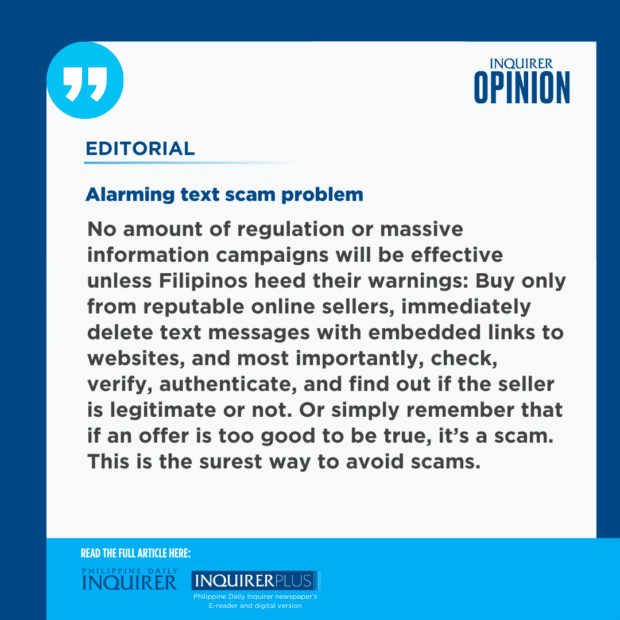Alarming text scam problem

The report last week that Filipinos lost about P460 billion in the past 12 months due mainly to text messaging scams is very disturbing, given the law on the mandatory registration of subscriber identity module (SIM) cards, the crackdown on illegal Philippine offshore gaming operators or Pogos engaged in these activities, and the awareness campaign being done by the government and private financial institutions.
According to the “2024 Asia Scam Report,” which surveyed nearly 25,000 participants across 13 markets in the region and released by the nonprofit organization Global Anti-Scam Alliance (Gasa), each Filipino victim lost on average P16,000 to online fraud. About 39 percent of 1,000 Filipinos in the poll — the majority of them in the 18 to 24 age group — had been victims of a racket, with only 3 percent of them able to recover their losses.
Across Asia, the report said that identity theft is the most common scam in China, Japan, Singapore, Taiwan, Thailand, and Vietnam, while investment fraud dominates the cases in Malaysia, Indonesia, and Pakistan. For the Philippines and India, shopping scams are most prevalent.
Suspicious website links
Another noteworthy finding of the study is that online scams are increasing in the country, with 67 percent of the Philippine respondents saying they had dealt with scams at least once a month and half of them admitting that they had encountered more fraud in the past 12 months. “Scams in the Philippines have reached an alarming level,” warned Aaron Chiou, product director of ScamAdviser, the Dutch partner of Gasa in the survey.
Four out of every five scams tricked unsuspecting victims into clicking suspicious website links sent via text messages that usually offer a host of too-good-to-be-true deals. When clicked, these links led to fake websites where users would be asked to input sensitive and personal information such as financial account details, phone numbers, and addresses — the data needed by hackers to take over one’s bank and e-wallet account to siphon money off.
Efforts to stamp out scammers should therefore focus on text messaging. While it is true, as the National Telecommunications Commission (NTC) had pointed out, that SIM registration is “not a silver bullet to end text scams,” stricter enforcement will help further reduce the incidence of text scams, the most common channel used by criminals.
Harsher penalties
Telcos should be made liable whenever their registered SIM cards are used in scamming activities, or answer for the SIM cards recovered by authorities in the course of their operations against cyber criminals as pointed out to the NTC by Sen. Sherwin Gatchalian back in June. Early this month, Sen. JV Ejercito also agreed that telecommunication companies should be held accountable for the continued spread of text scams and the use of SIM cards in scamming activities. “Why do authorities continue to confiscate thousands of SIM cards? Obviously, those were not registered. Telcos should be held liable,” he said.
On a positive note, the enactment of Republic Act No. 12010, or the Anti-Financial Account Scamming Act (Afasa), which President Marcos signed last July 20, can hopefully help curb this menace. It aims to protect citizens by requiring banks, e-wallet providers, and payment services to improve their fraud prevention systems. It also provides harsher penalties such as long prison terms for perpetrators of financial scams, expands the powers of the Bangko Sentral ng Pilipinas to probe fraud-related incidents to increase oversight and accountability within the financial system, and criminalizes “money muling,” imposing severe penalties on individuals who transfer money on behalf of scammers even if they are unaware of their involvement in fraudulent activities.
Root cause
However, the success of any effort to stop scammers lies in consumers themselves. If one were to trace the root cause of this persistent text scamming problem, greed definitely comes on top. Greed clouds rationality and common sense.
As the Gasa study found out, “Filipinos often fall for scams due to attractive offers and acting hastily, with many victims admitting uncertainty about the legitimacy of the offers but choosing to risk it anyway,” adding that just 41 percent of the respondents said they double-checked the legitimacy of the website link embedded on the messages to avoid falling victim to scams, especially if the offer was too attractive.
At the end of the day, at the risk of being repetitive, the real solution is with consumers. No amount of regulation or massive information campaigns will be effective unless Filipinos heed their warnings: Buy only from reputable online sellers, immediately delete text messages with embedded links to websites, and most importantly, check, verify, authenticate, and find out if the seller is legitimate or not. Or simply remember that if an offer is too good to be true, it’s a scam. This is the surest way to avoid scams.




















